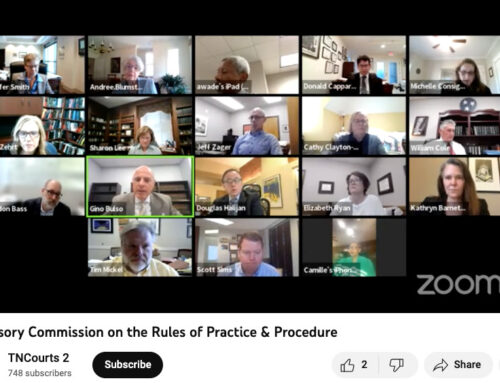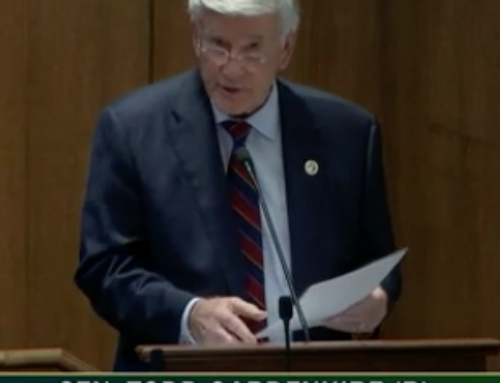NEWS from Tennessee Coalition for Open Government:
We have filed, along with Jack McElroy, editor of the Knoxville News Sentinel, a motion to intervene in the state’s opioid lawsuit against Purdue Pharma to oppose and object to any order restricting public access to records, exhibits, testimony, pleadings and other materials in the case.
Read:
Memorandum of law, citations of authority and argument in support of motion for leave to intervene
Tennessee Attorney General Herbert Slatery filed the action against OxyContin maker Purdue Pharma, L.P. on May 15 in Knoxville Circuit Court. The complaint was filed under seal with an accompanying motion and memorandum asking the court to allow the 270-page lawsuit, which contains “detailed factual allegations concerning the Defendant’s conduct,” to remain under seal for 10 days to give Purdue Pharma time to file a protective order.
The state said in its memorandum that the complaint “contains references to documents and information that Purdue Pharma asserts contain highly confidential, proprietary, or trade secret information.” However, the state argued that the complaint should be unsealed after 10 days “because the State is a public litigant, the Complaint involves a matter of immense public concern, and the Defendant in unlikely to show specific harm as a result from disclosure of the Complaint.”
Our motion, filed yesterday by Knoxville attorney and TCOG board member Rick Hollow, asks to intervene “for the purpose of opposing and objecting to any Order of this Court restricting public access to any records, exhibits, testimony, pleadings and other materials of any kind or nature received by the Court in the course of this litigation.”
We argue that “[t]here is a compelling interest by the citizens in the State of Tennessee pertaining to information regarding this issue. Not the least of these concerns is that whatever flows from opioid addiction becomes a matter of critical importance to the fabric of families, cities and counties as well as to taxpayers of the State of Tennessee who will inevitably be asked to, through their tax contributions, to assume the responsibility for the damages and losses suffered by the citizens of this state.”
Our arguments are outlined extensively in our memo filed with the motion. They center around the recognized presumptive rights of access of the public and of the press to trials and judicial records based on common law, the First Amendment, Tennessee’s constitution and state precedent. We also outline how such rights can only be overcome by a demonstrably stronger competing interest of substantial harm to the entity seeking closure.
Here is more from our motion to intervene:
…
9. Upon information and belief, based upon independent investigation, Intervenors assert that they have formed the opinion that the matters contained in the Complaint involve issues of immense public interest.
10. The suit filed by the State of Tennessee is in the nature of a civil enforcement action against a large branded manufacturer of opioids and is an effort to address the current opioid epidemic in Tennessee which is widely believed to be one of the most significant health crises in the history of the State.
11. The suit is brought under the Tennessee Consumer Protection Act (TCPA) against the Defendant to (1) protect consumers and the integrity of the commercial marketplace in Tennessee, (2) to remedy the Defendant’s violations of a 2007 Agreed Final Judgment (2007 Judgment), and (3) to abate and remedy a statewide public nuisance created by the Defendant’s interference with the commercial marketplace and endangerment of the public health.
12. It is alleged that the Defendant violated the TCPA by making a series of unlawful safety, comparative, and benefit claims about its opioid products, failing to disclose its material connection to third-party pain advocacy groups it substantially funded, and unfairly targeting vulnerable populations like the elderly.
13. Specifically, the Defendant is alleged to have made false, deceptive, and/or unsubstantiated claims about its opioid products or opioids in general including but not limited to:
a. Representing without qualification that OxyContin has no dose ceiling in spite of potential adverse effects at higher doses such as death and respiratory depression, among others;
b. Understating the risk of addiction from its opioid products by perpetuating the discredited concept of pseudoaddiction, which encouraged prescribers to prescribe more, not fewer, opioids to individuals exhibiting drug-seeking behavior;
c. Understating the risk of addiction by overstating the effectiveness of tools prescribers could use in their pain management practices to reduce or mitigate the risk of addiction;
d. Failing to disclose the increased risk of addiction from its opioid products at higher doses while making claims about high doses of opioids through upward titration or otherwise;
e. Failing to disclose the lack of substantiation supporting the long-term use of its opioid products while making claims advocating long-term use;
f. Falsely representing that its opioid products produced fewer peaks and valleys than short acting opioids leading to less euphoria, less abuse, and more effective pain relief;
g. Making sweeping safety claims about its opioid products without qualification;
h. Broadly representing that its own products are safer or more effective than competing opioid and non-opioid products;
i. Representing that its opioid products could improve a user’s quality of life generally;
j. Representing that its opioid products could improve a user’s ability to function;
k. Representing that its opioid products could improve a user’s sleep or acted as a sleep aid; and
14. The legislature of the State of Tennessee, during its just completed session, has addressed, in at least several legislative efforts, the issue of opioid addiction in the State of Tennessee.
15. The issue of opioid addiction and questions regarding the prescription of such medications has been widely debated and discussed in the media and in public and private meetings and gatherings.
16. There is a compelling interest by the citizens in the State of Tennessee pertaining to information regarding this issue. Not the least of these concerns is that whatever flows from opioid addiction becomes a matter of critical importance to the fabric of families, cities and counties as well as to taxpayers of the State of Tennessee who will inevitably be asked to, through their tax contributions, to assume the responsibility for the damages and losses suffered by the citizens of this state….
The state’s lawsuit is State of Tennessee, ex. rel. Herbert H. Slatery III, Attorney General and Reporter vs. Purdue Pharma, L.P. The judge hearing the case is Knox County Circuit Court Judge Kristi Davis.






